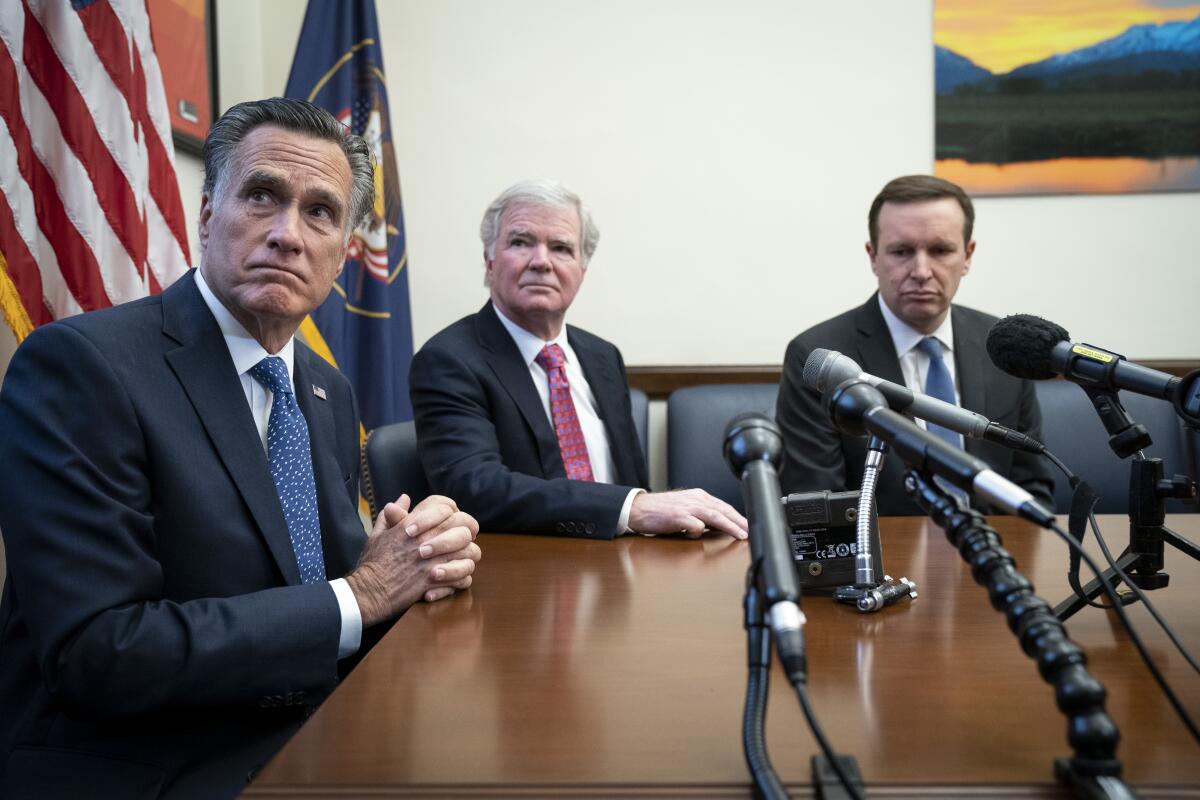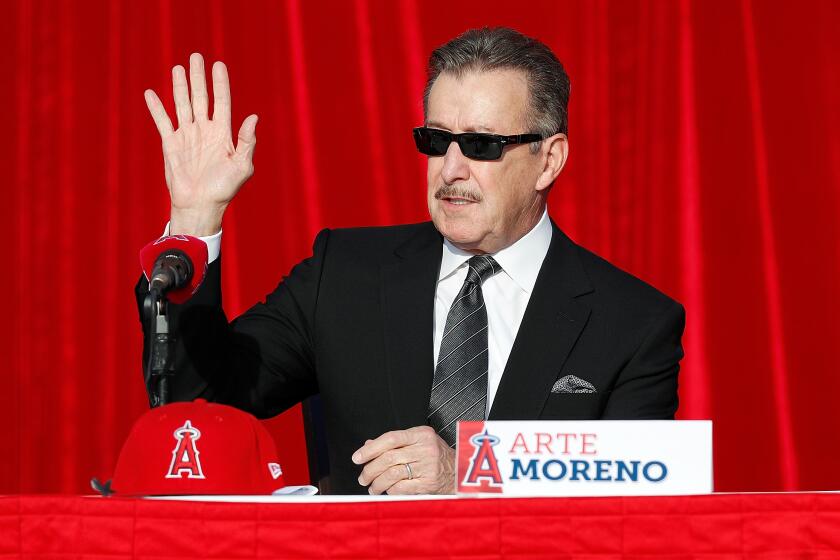NCAA President Mark Emmert meets with senators over pay for college athletes

- Share via
Feeling pressure from more than 20 states considering legislation similar to California’s historic Fair Pay to Play Act, NCAA President Mark Emmert spent Tuesday morning on Capitol Hill meeting with U.S. Sens. Christopher S. Murphy (D-Conn.) and Mitt Romney (R-Utah) to solicit federal support in creating a uniform solution for the association’s growing name, image and likeness (NIL) issue.
College athletes profiting from the use of their NILs in endorsement deals and hiring legal representation while on campus — as outlined in California’s Senate Bill 206, signed by Gov. Gavin Newsom into law Sept. 30 — is viewed as a problem by Emmert and the 1,100 universities that are members of the NCAA because it clearly constitutes the end of amateurism.
Emmert focused on a more practical argument Tuesday: If a bunch of states have different laws in place regarding NIL rights, how is the NCAA supposed to perform its role as a national governing body that is wholly dependent on its ability to regulate interstate commerce?
“I just left Senators Romney and Murphy, where I said we need your help right now,” Emmert said Tuesday afternoon at a symposium hosted by the Aspen Institute’s Sports and Society Program in Washington, D.C.
“The debate and discussion is well past the ability of a group of states to resolve it. I feel very strongly, as do all the universities, that college sports shouldn’t be run out of the federal government … but in terms of addressing these issues and creating a legally valid model in which the schools can provide more than what they do now, whatever that might look like, it has to be created at a national level.”
As for what the future of college sports should look like, Emmert stuck with the talking points presented in the NCAA’s October announcement that its Board of Governors had voted to start the “process to enhance name, image and likeness opportunities.” While the NCAA said it is now open to “modernizing” its rules, it also released guiding principles that Emmert reaffirmed, including any additional benefits being “tethered to education,” athletes not being employees of the schools, and there not being an open market for the recruitment of athletes.
Among key players in the college athlete rights movement gathered at the symposium, Emmert’s motives for seeking a federal solution were questioned.
“They’re trying to tell the states to hold on and wait for us, meanwhile they’re going to Congress trying to get legislation to preempt the states in the ways the NCAA would like,” said Ramogi Huma, the executive director of the National College Players Assn., which advocates for the rights of college athletes.
“The NCAA is against what California has done, what every single state lawmaker wants to accomplish. To come up here and try to undermine that effort, I just hope the members of Congress [in] both the Senate and the House try to connect the dots. In essence, the NCAA wants the status quo, and they are praying Congress will grant that.”
Anaheim has released a study that shows what Angels owner Arte Moreno and his partners might do with the Angel Stadium property after they buy it.
Huma, a Southern California native and former UCLA football player, said he has been meeting with Congressional representatives too. He also said it’s probably much easier for Emmert and NCAA lobbyists to be seen and heard in D.C. than folks like him.
“If Congress is going to get involved, we would like to see a players’ bill, not an NCAA bill,” Huma said. “If Congress rolls back anything that California has done in terms of representation and no caps on the type of money a player can get from third parties, that’s [an] NCAA bill. We are not opposed to uniformity. It could be a good thing, if it’s a players’ bill.”
In March, U.S. Rep. Mark Walker (R-N.C.) introduced the Student-Athlete Equity Act, which is legislation that would amend the definition of a qualified amateur sports organization in the tax code to remove the restriction on college athletes using or being compensated for the use of their NIL, which would force the NCAA to change its current model.
Walker attended the symposium Tuesday. He was critical of Emmert for choosing not to meet with him but instead with the two senators, saying that he has made multiple attempts to have an audience with Emmert to no avail.
“I believe it has bipartisan support,” Walker said. “Whether looking at this as a civil rights issue or a Republican free-market issue, they’re both the same. It’s a win-win. We’re not asking the NCAA or the university in our bills to pay a single dollar. We’re just saying, as for every other student, if you have a music scholarship, you can go play a gig and get paid for it. It’s only the student-athletes that we have carved out a specific segment of our society and said you’re the only ones in our country that we own you and your likeness while you’re at this university.”
Walker said his bill is currently on hold. He said he will give the NCAA and its working group on name, image and likeness legislation until April 2020 to bring forward tangible ideas for reform. If April brings more vague discussion of change, Walker said he will push his bill in the House Committee on Ways and Means.
Based on Emmert’s comments Tuesday, he will be pursuing a bill from Congress that is more favorable to NCAA interests.
“Under [California’s] model,” Emmert said, “you’d have agents representing a youngster who is working a school to see what kind of sponsorship deal they can line up through their boosters. As athletic directors and boosters and student-athletes look at that, they say that seems utterly unworkable and unmanageable. The membership, the vast majority are more than happy to find ways to create new, interesting opportunities, but they look at that model and say that doesn’t meet any of the kinds of principles they’ve already established as guardrails for keeping college sports intact.”
Leading into the 2020 NCAA Convention in Anaheim on Jan. 22-25 and beyond, the NIL issue will be Emmert’s top priority.
Emmert said the NCAA is open to bringing back the popular EA Sports NCAA football video game series and giving players a cut of the revenue, but he said a method of group licensing for college athletes would have to be created that doesn’t involve them being unionized.
Could Congress provide a pathway for the obstacles ahead?
Sens. Murphy and Romney are part of a working group established this month that will be taking the lead. In a news conference with Emmert on Tuesday, the senators did not sound interested in perpetuating the status quo.
“I’m in support of the California law,” Murphy said, “but I also acknowledge that this is a national endeavor, college sports, and it really can’t ultimately work with 50 different state laws. So I would like to see us work with the NCAA and student-athletes to try to come up with a federal solution that not only addresses the issue of having access to revenue through name, image and likeness but also speaks to issues of broader compensation and perhaps a fairer mechanism of compensation other than simply making money off endorsement deals.”
More to Read
Go beyond the scoreboard
Get the latest on L.A.'s teams in the daily Sports Report newsletter.
You may occasionally receive promotional content from the Los Angeles Times.












